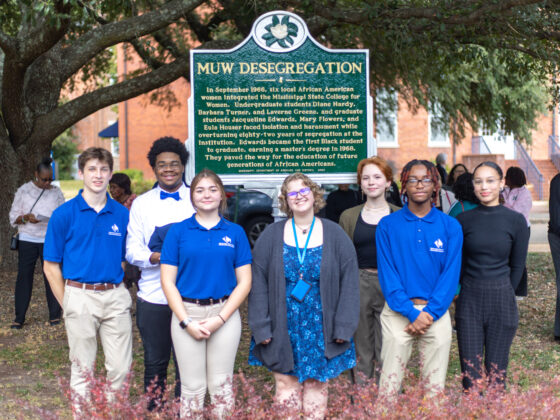This story was originally published in the Daily Yonder. For more rural reporting and small-town stories visit dailyyonder.com.
For more than 30 years, the Laclede Literacy Council has made a difference for rural Missourians seeking to improve their lives through the written word. In recent years, those efforts have grown to include passing the HiSET high school equivalency exam, becoming U.S. citizens, improving media literacy, and more.
In recent times, a team of 18 tutors were paid living allowances, which helped them to devote meaningful time to the project, and grew their capacity to nearly 100 consecutive clients in 2025.
That work changed in early July with one email: The center would lose $249,000 it expected to receive from AmeriCorps in 2025-2026 as part of a three-year grant cycle, nearly eliminating the organization’s entire workforce.
“It was a shock,” said Dr. Carol Barsby, the center’s executive director. “On April 30, DOGE made cuts at the AmeriCorps, and they cut from 27 programs to eight programs in the state of Missouri, and we were one of those eight programs that met the new government criteria at that point in time. So we were pretty confident that we were okay. And we heard from our person at ServMO [the distributing agency] over and over, ‘You’re okay, you’re okay. Don’t worry about it. You’re okay, you’re okay.’
“Then, on July 2, out of the clear blue sky, I got about three sentences that said, ‘Sorry, you were not chosen for a grant this year. Have a nice holiday weekend.’”
While Barsby plans to apply for grant funding in the future, she says the sudden change means drastic shifts for the nonprofit, which is grappling with a new reality: for its tutors, who are now effectively out of work, and to the literacy council’s six-county footprint.
“It changes your whole community,” Barsby said. “We’re part of the Department of Economic Development because if you don’t have an educated workforce, you can’t bring in new business, you can’t bring in new industry – you don’t have that workforce.
“Our rural companies have got to continue to invest in and bring industry to us and bring business to us so there are jobs in our area and our young people stay here.”
The Need for Laclede Literacy Council
From its place in a little shopping center, the Laclede Literacy Council opens doors to a better life for Lebanon, the mid-Missouri community that once had a strong manufacturing base. Today, the town of about 15,000 still has some of those jobs, Barsby said, but the fewer options require more education than in the past.
“Most of our factories in this area are the boat factories here in Lebanon,” Barsby said. “They used to be hard-hat jobs. They used to be where you nailed in the carpeting. Now, they’re highly digital, robotized jobs – and to get that job, you have to have a good education.”
When someone seeks help from the center, they take a proficiency exam to see their skill level. They’re then placed with a tutor who works with them several times a week, at no charge. Some individuals come to the center while others are served virtually, including employees of a Missouri sheriff’s department in need of more staff.
“They could not hire enough jailers that had a high school diploma,” Barsby said. “We tutor with those folks about twice a week and give them homework, and they spend four hours a day finishing that up and getting done, so then they can get that job.”
There are young adults who barely missed out on graduating from high school. Grandparents who are doing it for their grandkids. Regardless of why someone ends up at the center, Barsby says the decision to seek help is significant.
“To walk in the door and say, ‘I need help,’ or, ‘I can’t do this’ is a big step,” she said. “It’s hard to jump through that hoop and say, ‘Help me.’”

Tammy Sloan, who sat at the reception desk when I walked into the center, can speak to this reality. After about a year of employment, she was let go from her previous job after her employer realized she didn’t have a high school diploma. She disclosed it on her application, she said, but they didn’t note it at the time.
“I was one of the top three (employees) that month, and I got fired,” she shared. Unhappily, she called the literacy council to inquire about tutoring. “I was like, ‘I’ve got to get (my diploma). I’ve got to get my job back,’ I was scared.”
Those emotions changed as she received tutoring and began volunteering at the desk. And thanks to the tutoring she received, Sloan passed her math HiSET subtest just days before my visit. That past anxiety and annoyance have turned to tears when asked why she likes being part of the center’s team.
“I like helping people. It’s like family,” she said, emotion creeping into her voice. “You get attached to the people that come in, and you root for them every day. Somebody calls and says, ‘I passed the test,’ you can hear the whole office explode.”

Daniel Ford’s story also changed because of the center. On his own early in life, Ford took several trips through the seventh and eighth grades before dropping out of school. Later, he served time in prison before coming to the literacy council as a requirement of his probation.
He’s now a tutor. Working to pass the HiSET. With newfound confidence in hand.
“When I got here, this place showed me something that I’d never seen. It showed compassion,” he said. “I like coming in here every day and seeing these people, and talking to these people. I know a lot of people in the community; they’re like, ‘Wow, you’re here? How’d you get this?’ I’m like, ‘Because I’m smart.’”
Under these funding cuts, both Ford and Sloan are no longer compensated for their work at the center.
“It’s so easy to look the other direction when we look at rural areas and we look at small towns and say, ‘They’ll be fine. They’ll help each other. They have churches that’ll do those things,’” Barsby said. “But there are so many things that need to be done that that’s hard.”
Funding Cuts That Change the Future
Barsby said that the funding was part of a pool of funding allocated by AmeriCorps to the Missouri Department of Economic Development. Applicants apply to AmeriCorps, are vetted, but the funding decisions are ultimately made by the Missouri Community Service Commission, also known as ServMO.
I reached out to ServMO for clarification on the literacy center’s funding changes. Brittany Crabtree, ServMO’s executive director, responded that, “Continuation awards for future years are not guaranteed; they depend upon future appropriations and satisfactory performance.”
Crabtree also wrote: “The applicant received a ‘not selected’ letter and a feedback letter outlining the reasons the application was not selected.”

Barsby shared a copy of the feedback the literacy council received. It claimed the literacy council didn’t adequately explain organizational capability, member experience, and member supervision – things that Barsby said satisfied grant evaluators in the past two years.
In a response to the denial, she wrote that the literacy council met its performance goals by more than 100% each year of the grant, and works directly with 31 non-profits in its community, the public school, and the treatment court without implementation issues.
The bottom line: The funding piece is confusing, but regardless of why the funding was cut, it doesn’t change the fact that this resource, at least temporarily, will look different for a substantial number of people in a rural part of Missouri.
“With this denial, a small community has lost 15 jobs, and the people who are helped by this program will lose out the most,” Barsby wrote in her response to the denial letter. “I understand budget cuts well, but when you cut your budget, do you cut the entire food budget or reduce it slightly from each category?”
What Does the Future Look Like?
Despite this setback, Barsby and the center’s tutors remain committed to their mission.
“I have 99 current, active people right now,” she said. “We’ll be able to serve probably a third of that.
“That’s why my volunteers keep saying, ‘I’ll stay until ‘mine’ graduate. I’ll get the ones I’m working with done so we don’t let those people down.’ I can’t imagine having to tell people, ‘I don’t have a tutor for you anymore.’ I can’t imagine that.”
Some might say it’s not that big of a deal to simply go back to unpaid volunteers. That’s technically an option – but given that this reality is about money, I should point out this comes at a cost. Serving fewer people may mean a lower quality of life for those individuals, fewer employees in local businesses, and fewer opportunities in rural spaces.
And then there’s the reality of second chances.
“I thought I was one of the dumbest people I’d ever met until I got here,” said Ford, the client and tutor. “I started learning and started seeing more people like me that were smart, and they just don’t realize it. I’m really passionate about this.”
“If it wasn’t for places like this here that gave me the opportunity, knowledge, and the wisdom to do what I’m doing, I’d probably still be in prison or off in the gutter somewhere – for real.”
Maybe the center will have a second chance of its own, too. Barsby hasn’t given up on her people, and she’s not giving up on the center.
“We will keep something going,” Barsby said. “I don’t know that it will look like it used to look, but we will be here and we will apply for other grants and see what’s out there.”
This article first appeared on The Daily Yonder and is republished here under a Creative Commons Attribution-NoDerivatives 4.0 International License.




